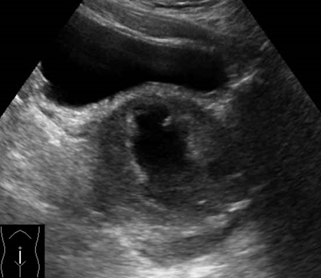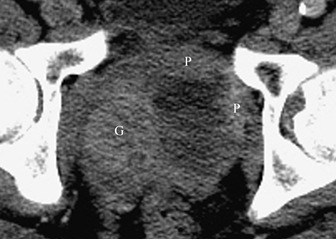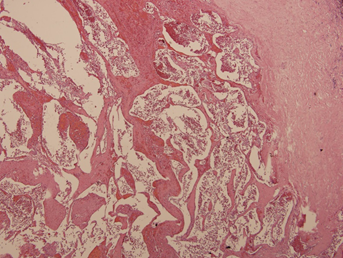Hemangioma of the Prostate: A Case Report and Literature Review
Article Information
Hsu Fu-Kai1, Hung Siu-Wan2, Wu Chih-Ying3, Chiang Heng-Chieh4 and Chiu Kun-Yuan5*
1Taichung Veterans General Hospital, Taichung, Taiwan
2Department of Radiology, Taichung Veterans General Hospital, Taichung, Taiwan
3Department of Pathology and Laboratory Medicine, Taichung Veterans General Hospital, Taichung, Taiwan
4Division of Urology, Department of Surgery, Changhua Christian Hospital, Changhua, Taiwan
5Division of Urology, Department of Surgery, Taichung Veterans General Hospital, Taichung, Taiwan
*Corresponding Author: Chiu Kun-Yuan, Division of Urology, Department of Surgery, Taichung Veterans General Hospital, Taichung, Taiwan
Received: 01 September 2017; Accepted: 18 September 2017; Published: 22 September 2017
View / Download Pdf Share at FacebookAbstract
Hemangioma of the prostate is extremely rare. Here we described a 69-year-old man who had lower urinary tract symptoms (LUTS) for 5 years, treated as benign prostate hyperplasia (BPH) by Diode laser enucleation. Massive bleeding developed during the procedure with subsequently recurrent urine retention due to blood clot accumulation off and on for the following 3 years. Selective arterial embolization and repeated bladder irrigation failed to control the continuous bleeding, which finally caused obstructive uropathy. Cystoprostatectomy was then performed and the pathological result proved cavernous hemangioma of the prostate.
Keywords
Hemangioma, Laser therapy, Lower urinary tract symptoms, Prostate
Hemangioma articles Hemangioma Research articles Hemangioma review articles Hemangioma PubMed articles Hemangioma PubMed Central articles Hemangioma 2023 articles Hemangioma 2024 articles Hemangioma Scopus articles Hemangioma impact factor journals Hemangioma Scopus journals Hemangioma PubMed journals Hemangioma medical journals Hemangioma free journals Hemangioma best journals Hemangioma top journals Hemangioma free medical journals Hemangioma famous journals Hemangioma Google Scholar indexed journals Laser therapy articles Laser therapy Research articles Laser therapy review articles Laser therapy PubMed articles Laser therapy PubMed Central articles Laser therapy 2023 articles Laser therapy 2024 articles Laser therapy Scopus articles Laser therapy impact factor journals Laser therapy Scopus journals Laser therapy PubMed journals Laser therapy medical journals Laser therapy free journals Laser therapy best journals Laser therapy top journals Laser therapy free medical journals Laser therapy famous journals Laser therapy Google Scholar indexed journals Lower urinary tract symptoms articles Lower urinary tract symptoms Research articles Lower urinary tract symptoms review articles Lower urinary tract symptoms PubMed articles Lower urinary tract symptoms PubMed Central articles Lower urinary tract symptoms 2023 articles Lower urinary tract symptoms 2024 articles Lower urinary tract symptoms Scopus articles Lower urinary tract symptoms impact factor journals Lower urinary tract symptoms Scopus journals Lower urinary tract symptoms PubMed journals Lower urinary tract symptoms medical journals Lower urinary tract symptoms free journals Lower urinary tract symptoms best journals Lower urinary tract symptoms top journals Lower urinary tract symptoms free medical journals Lower urinary tract symptoms famous journals Lower urinary tract symptoms Google Scholar indexed journals Prostate articles Prostate Research articles Prostate review articles Prostate PubMed articles Prostate PubMed Central articles Prostate 2023 articles Prostate 2024 articles Prostate Scopus articles Prostate impact factor journals Prostate Scopus journals Prostate PubMed journals Prostate medical journals Prostate free journals Prostate best journals Prostate top journals Prostate free medical journals Prostate famous journals Prostate Google Scholar indexed journals Cystoprostatectomy articles Cystoprostatectomy Research articles Cystoprostatectomy review articles Cystoprostatectomy PubMed articles Cystoprostatectomy PubMed Central articles Cystoprostatectomy 2023 articles Cystoprostatectomy 2024 articles Cystoprostatectomy Scopus articles Cystoprostatectomy impact factor journals Cystoprostatectomy Scopus journals Cystoprostatectomy PubMed journals Cystoprostatectomy medical journals Cystoprostatectomy free journals Cystoprostatectomy best journals Cystoprostatectomy top journals Cystoprostatectomy free medical journals Cystoprostatectomy famous journals Cystoprostatectomy Google Scholar indexed journals Computed Tomography articles Computed Tomography Research articles Computed Tomography review articles Computed Tomography PubMed articles Computed Tomography PubMed Central articles Computed Tomography 2023 articles Computed Tomography 2024 articles Computed Tomography Scopus articles Computed Tomography impact factor journals Computed Tomography Scopus journals Computed Tomography PubMed journals Computed Tomography medical journals Computed Tomography free journals Computed Tomography best journals Computed Tomography top journals Computed Tomography free medical journals Computed Tomography famous journals Computed Tomography Google Scholar indexed journals LUTS articles LUTS Research articles LUTS review articles LUTS PubMed articles LUTS PubMed Central articles LUTS 2023 articles LUTS 2024 articles LUTS Scopus articles LUTS impact factor journals LUTS Scopus journals LUTS PubMed journals LUTS medical journals LUTS free journals LUTS best journals LUTS top journals LUTS free medical journals LUTS famous journals LUTS Google Scholar indexed journals prostatic hemangioma articles prostatic hemangioma Research articles prostatic hemangioma review articles prostatic hemangioma PubMed articles prostatic hemangioma PubMed Central articles prostatic hemangioma 2023 articles prostatic hemangioma 2024 articles prostatic hemangioma Scopus articles prostatic hemangioma impact factor journals prostatic hemangioma Scopus journals prostatic hemangioma PubMed journals prostatic hemangioma medical journals prostatic hemangioma free journals prostatic hemangioma best journals prostatic hemangioma top journals prostatic hemangioma free medical journals prostatic hemangioma famous journals prostatic hemangioma Google Scholar indexed journals patient articles patient Research articles patient review articles patient PubMed articles patient PubMed Central articles patient 2023 articles patient 2024 articles patient Scopus articles patient impact factor journals patient Scopus journals patient PubMed journals patient medical journals patient free journals patient best journals patient top journals patient free medical journals patient famous journals patient Google Scholar indexed journals pathology articles pathology Research articles pathology review articles pathology PubMed articles pathology PubMed Central articles pathology 2023 articles pathology 2024 articles pathology Scopus articles pathology impact factor journals pathology Scopus journals pathology PubMed journals pathology medical journals pathology free journals pathology best journals pathology top journals pathology free medical journals pathology famous journals pathology Google Scholar indexed journals
Article Details
Abbreviations:
BPH: Benign Prostate Hyperplasia; CT: Computed Tomography; LUTS: Lower Urinary Tract Symptoms; PSA: Prostate Specific Antigen; TURP: Transurethral Resection of the Prostate
1. Introduction
LUTS is the symptoms related to storage, voiding, or post micturition. It is primarily attributed to BPH in elderly men [1]. Hemangioma, a vascular malformation, is an extremely rare etiology of LUTS. When hemangioma was large enough, it can lead to LUTS. Gross hematuria is the cardinal symptom of urinary tract hemangioma, but it is difficult to confirm the diagnosis by conventional radiographic examination [2]. If prostatic hemangioma presents with LUTS rather than hematuria, we may easily confuse it with BPH. Transurethral resection of the prostate (TURP) had been used to treat the prostatic hemangioma with transient complication of a slow stream and initial voiding difficulty [3]. Selective arterial embolization had been applied on prostatic hemangioma treatment with only one episode of hematuria after the procedure [4]. The perineal intracapsular prostatectomy was performed in a reported case, but the patient was dead due to uncontrollable bleeding during the operation [5]. Thus, misdiagnosis of prostatic hemangioma can lead to a tragedy. We present a case of prostatic hemangioma treated with Diode laser enucleation complicated with repeated bleeding and obstructive uropathy for 3 years.
2. Case Report
A 69-year-old man had LUTS since 5 years ago. The rectal examination showed a huge prostate with multiple nodularity. Serum prostate specific antigen (PSA) level was 8.74 ng/ml. Transrectal ultrasound disclosed the prostate was 89 × 71 × 76mm with an internal 45 × 24mm cystic lesion (Figure 1). Abdominal computed tomography (CT) revealed an enlarged prostate with a well-enhanced glandular hyperplasia structure and peripheral enhancement similar to "ring of fire" in the delay phase (Figure 2). Although prostate cancer cannot be ruled out, the patient decided to receive Diode laser enucleation of the prostate. Massive intraoperative bleeding was noted and Foley’s catheter traction was performed. After the procedure, LUTS was improved but intermittent hematuria with recurrent urine retention bothered him in the following 3 years. Bladder irrigation by cystoscopy and even cystoscopic evacuation of hematoma were performed for several times. This patient also received selective arterial embolization for twice but in vain. He had obstructive uropathy with acute renal failure (serum creatinine level 12.0 mg/dl) developed 4 years later. Bilateral percutaneous nephrostomy were introduced and the renal function recovered (serum creatinine level 2.5 mg/dl). The serum PSA increased to 12.49 ng/ml and non-contrast CT revealed marked enlargement of the prostate gland due to hemorrhage. Laparoscopic radical cystoprostatectomy with ileal conduit reconstruction was performed. The pathology proved cavernous hemangioma with hematoma of the prostate (Figure 3) and incidental adenocarcinoma of the prostate (Gleason's score: 3+3=6).

Figure 1: Ultrasonography demonstrated a huge prostate with a 45 mm x 24 mm multiloculated cystic lesion.

Figure 2: Delay-contrasted CT revealed a hypoattenuated lesion in left lobe with peripheral enhancement (P) similar to "ring of fire". Note that the well-enhanced glandular hyperplasia structure (G) on the right lobe.

Figure 3: Irregular dilated and anastomosing vascular channels accompanied with fibrosis in prostate (H&E, 100X) were noted under microscopic evaluation. Cavernous hemangioma with hematoma in prostate is impressed.
3. Discussion
|
Case |
Authors |
Age |
Symptom |
Pre-operative image finding |
Treatment |
Complication |
|
1 |
Rivoir et al (1953) (5) |
65 |
LUTS |
Cystoscopy: bladder |
Prostatectomy |
Death |
|
2 |
Fiorelli et al (1991) (4) |
30 |
Hematuria and |
Cystoscopy: bluish-red |
Selective arterial |
Hematuria once |
|
3 |
Ristau et al (2011) (6) |
69 |
Asymptom |
No remarkable finding |
Prostatectomy |
No |
|
4 |
Serizawa et al (2011) (3) |
84 |
LUTS |
No remarkable finding |
TURP |
Slow stream and initial |
4. Conflicts of Interest
The researcher claims no conflicts of interests.
References
- Oelke M, Bachmann A, Descazeaud A, et al. EAU guidelines on the treatment and follow-up of non-neurogenic male lower urinary tract symptoms including benign prostatic obstruction. European urology 64 (2013): 118-140.
- Jahn H, Nissen HM. Haemangioma of the urinary tract: review of the literature. British journal of urology 68 (1991): 113-117.
- Serizawa RR, Norgaard N, Horn T, et al. Hemangioma of the prostate--an unusual cause of lower urinary tract symptoms: case report. BMC urology 11 (2011): 4.
- Fiorelli RL, Koolpe HA, Klaus RL. Use of polyvinyl alcohol in treatment of bladder and prostatic hemangioma. Urology 38 (1991): 480-482.
- Rivoir J, Kaslaris E. Beitrag zum prostatahamangiom. Der Chirurg; Zeitschrift fur alle Gebiete der operativen Medizen 24 (1953): 426.
- Ristau BT, Tomaszewski JJ, Parwani AV, et al. Incidentally discovered capillary hemangioma of the prostate. The Canadian journal of urology 18 (2011): 5914-5915.
- Vilgrain V, Boulos L, Vullierme MP, et al. Imaging of atypical hemangiomas of the liver with pathologic correlation. Radiographics : a review publication of the Radiological Society of North America, Inc. 20 (2000): 379-397.
- Shabaik A. Nonepithelial tumors and tumor-like lesions of the prostate gland. Critical reviews in clinical laboratory sciences 40 (2003): 429-472.
- Bryniak SR, Morales A, Challis T. Assessment of cavernous hemangioma of bladder by technetium-99-tagged albumin scan. Urology 13 (1979): 289-291.
- de Leon JP, Arce J, Gausa L, et al. Hemangioma of the prostatic urethra: holmium laser treatment. Urologia internationalis 80 (2008): 108-110.
